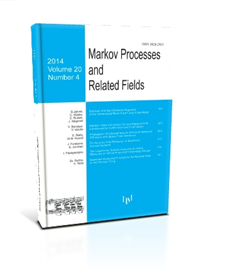Systems out of Equilibrium
P. Collet
2001, v.7, Issue 1, 117-118
ABSTRACT
Physical systems out of equilibrium are ubiquitous and have been the subject of intense study in particular since Boltzmann major breakthrough. Despite this intensive activity leading sometimes to heated debates among physicists, the problem is still far from satisfactorily solved. In particular some new promising ideas have emerged recently and it seemed timely to have a meeting with several of the recent contributors to this field. The first talk was given by J. Lebowitz about the notion of patterns. Non equilibrium systems (and equilibrium ones as well) often show more or less regular patterns, but this notion is rather elusive and a working definition is still looked for. The talk presented results in this direction for point processes. The second talk by C. Maes and the third talk by G. Gallavotti were devoted to the questions of entropy production and the large fluctuations of volume contraction during the time evolution of reversible systems. The affine large deviation behavior has been proposed by Ruelle and Gallavotti-Cohen as a principle for systems out of equilibrium. C. Maes described among other things the relations with irreversibility and spatio-temporal Gibbs measures. G. Gallavotti explained in particular how one can generalize the notion of equivalence of ensembles to obtain reversible systems equivalent to irreversible ones and discussed the possibilities of observing experimentally these effects. The fourth talk by C.A. Pillet presented an approach to systems far from equilibrium based on spectral theory, with a particular view towards systems coupled to heat reservoirs. Notions from the theory of $C^{*}$-algebras prove to be also fruitful for classical systems and leads to a definition of entropy production and heat flows. The fifth talk was delivered by S. Meleard about the Boltzmann equation. Using a probabilistic representation for the solutions, one can devise various approximation schemes leading in particular to interacting particle systems. Convergence of these schemes are also investigated in the form of central limit theorems. The last talk was given by J.-P. Eckmann about a chain of non linear oscillators with ends coupled to heat baths at different temperatures. This is a natural simple system where one could expect to observe a heat flow. The main difficulty which has been solved was to prove that there is in this situation a stationary measure. It has also been shown that this measure is unique, mixing, has a regular density and a non trivial heat flux.
COMMENTS
Please log in or register to leave a comment

